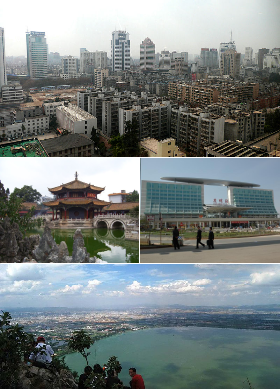
Malaysia Airlines flight MH370 recently disappeared over the South China Sea, carrying 239 passengers, 152 from China.
On March 1, fewer than seven days earlier, an Associated Press bulletin had reported: “Around 30 killed and more than 100 injured in a Kunming, China train station attack.”
Ben Bates’ first thoughts were of his friends in Kunming.
“Were they injured? Who could I contact?”
Bates, Ole Miss class of 2013, is a student at the University of Mississippi Medical Center. Bates studied in Kunming in the fall of his senior year.
“Kunming is the first city outside the United States that I felt I could call home,” he said a few days ago.
After following the news from AP and New York Times he got news directly from China. Fortunately, none of his friends had been injured.
Many hours after the attack, neither China Daily nor the Xinhua news agency had released anything about the tragedy, Bates added.
Megan Loria, a former student in the Ole Miss Chinese Flagship Program, had the same problem: “I couldn’t find it on any Chinese sources the day it happened,” she said.
At 7:03 am on March 2, which was 5:03 pm central time on March 1 in the United States, Xinhua finally sent a report that eight knife-wielding men and women attacked passengers at the city’s railway station about 9 pm on March 1 in China. Twenty-nine people were dead, and 143 were injured. Police killed three men and one woman at the scene and captured a female suspect. Officials said this was a terrorist attack planned by Xinjiang separatists.

There were many posts on Sina Weibo micro blog, a popular social media site in China, condemning Uighurs people from Xinjiang Province.
The Guardian quoted The Associated Press as saying the police were rounding up members of the city’s Uighur community, thought to number at most several dozens.
“How do we know them?” asked a Uighur man who gave only his first name, Akpar. “We could not tell if the assailants were Uighurs. They all were dressed in black. We did not like the attack either.”
Just as Muslim people have had a relatively more difficult life in United States since 911, Uighurs, a minority people, are experiencing prejudice and misunderstanding in China.
Bates has strong concerns about how the attack will affect Kunming’s ethnically and culturally diverse population. Until now it has been a refreshingly relaxed and carefree community.

“My favorite restaurant in Kunming is owned by an affable gentleman and his family,” he said. “My underlying fear for these people is based on one simple fact — they are ethnically Uighur. Since it was supposedly Uighurs who orchestrated the attack at the train station, I fear rising, yet misplaced, anger easily could be directed at the local and national Uighur population.”
The fact of 29 lives callously lost and brutally cut short evokes sorrow, horror and anger. Too much anger can cloud judgment.
Right after the attack, a post on Weibo said, “The terrorists tried to grab the public’s attention by murdering people. However, who do you think you are? We have the right to refuse listening to your stories.”
But Hongkai Liu, an Ole Miss student from China, disagreed with this statement. “Because of the limited information, we barely have any idea about the conflict between the Han and ethnic minorities…. We deserve to know the truth.”
According to the Oriental Daily in Hong Kong, the attacker arrested at the scene was just 16 years old.
“What pressure would push someone to choose a bloody life and to even risk one’s own life?” Liu asked. “That is what we should know.”
The BBC reported on March 4 that Guangrong Qin, the Communist Party Chief of Yunnan Province, said eight attackers tried to cross the border of China from either Guangdong or Yunnan Province to participate in jihad outside of China.
“They failed. So once again they returned to Yunnan and hatched a plan to target Kunming transport terminals,” Qin said.
The above information could not be found in Chinese media. Neither could we find more specific information about the arrested attackers.
Why did they attempt a jihad?
Why did they choose Kunming train station?
Did the attack have anything to do with the ethnic riots in Urumchi, the capital of Xinjiang Province, in 2009?
In recent years, high-profile attacks have increased in China. The government has disclosed at least 10 terrorist attacks in 2013 alone. Nine attacks occurred in Xinjiang. The 10th attack involved a car crashing in Tiananmen Square on October 28.
Now the disappearance of Malaysia Airlines flight MH370 over the South China Sea has followed the massacre in Kunming, and many users of Weibo are worried that the crash might be the result of another terrorist attack.
“I understand there may have been national security interests behind not wanting to release certain information about the attack, but in my opinion the overall lack of transparency could result in unchecked government authority and public misunderstanding,” Bates said.
These consequences can lead to abuse of power by authorities, mistrust and xenophobia within the community.
Chun Wu is a second-year graduate Integrated Marketing Communication student from Guangdong Province, China. You can email her at cwu1@go.olemiss.edu
